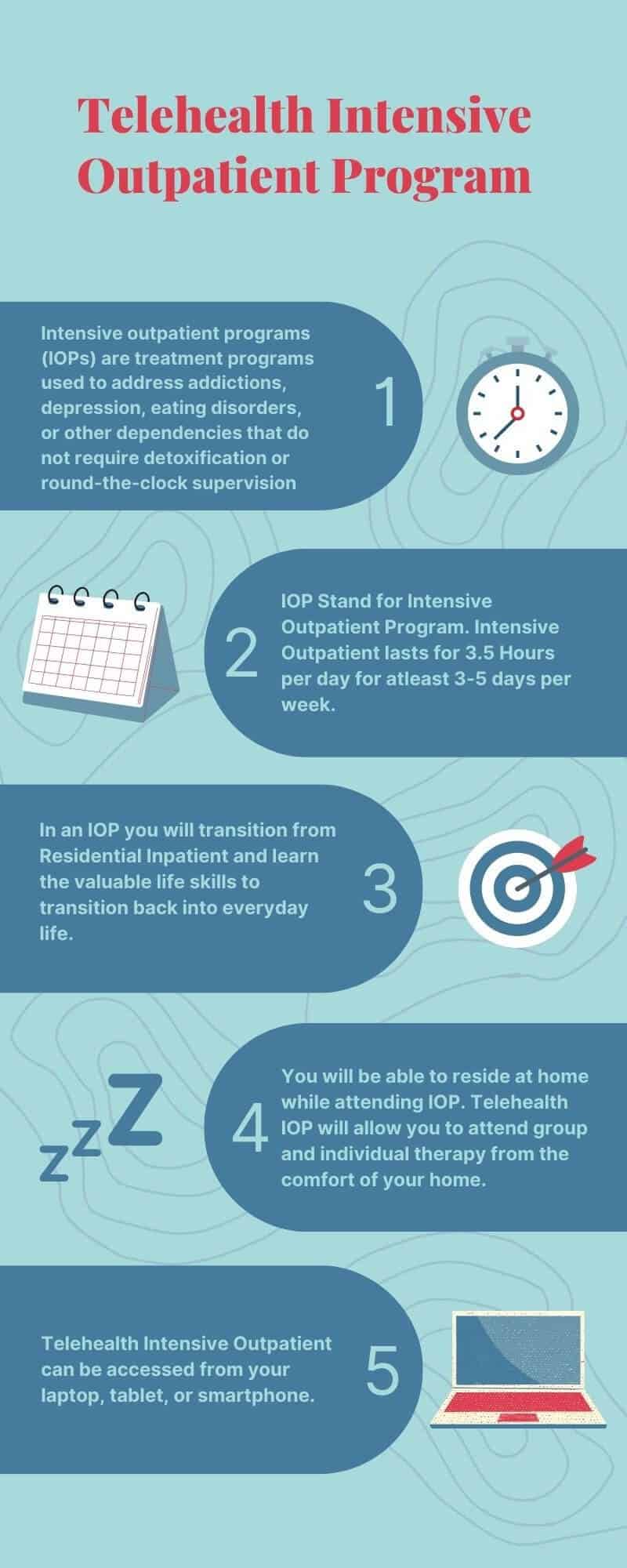Budget Friendly and Reliable Intensive Outpatient Program (IOP) Solutions Near You.
Wiki Article
Browsing the Complexities of Dual Diagnosis Treatment Within an Extensive Outpatient Program Setting
In the world of psychological health and wellness and addiction treatment, the crossway of double medical diagnosis provides a nuanced challenge that demands a thorough and tailored technique. Within the confines of an Intensive Outpatient Program (IOP) setting, the complexities of attending to co-occurring psychological health and wellness problems and compound use conditions need a delicate equilibrium of knowledge and resources to navigate. The combination of evidence-based methods, collaborative initiatives amongst multidisciplinary groups, and an eager understanding of the distinct demands of each individual are important parts in efficiently taking care of double medical diagnosis within an IOP structure. By exploring the details of dual medical diagnosis therapy within this intensive outpatient context, a clearer path arises in the direction of alternative and sustainable recovery for those grappling with these intertwined difficulties.Twin Diagnosis Summary

Recognizing twin medical diagnosis is necessary as it requires a comprehensive and integrated approach to therapy. By recognizing the interplay in between material usage and mental health, health care suppliers can tailor interventions to fulfill the unique requirements of each person. This holistic technique not only addresses signs and symptoms yet also targets underlying variables that add to the twin medical diagnosis.
Additionally, untreated double diagnosis can bring about a cycle of regression and getting worse mental wellness signs and symptoms. By recognizing the intricacy of double medical diagnosis and supplying specialized treatment, medical care experts can support people in attaining long-lasting recuperation and enhanced psychological health.
Tailored Therapy Strategies
Recognizing the elaborate interplay between substance use conditions and psychological health and wellness problems, the advancement of customized treatment plans is critical in dealing with the complexities of twin diagnosis in psychological wellness treatment. Tailored therapy plans are individualized techniques that think about the special demands, difficulties, and goals of individuals facing twin medical diagnosis. These strategies are designed collaboratively by a multidisciplinary group of experts, consisting of psychiatrists, psychologists, social employees, and addiction professionals, to guarantee thorough and incorporated care.Tailored treatment plans normally involve a combination of therapies, medicines, and behavior interventions that target both the substance usage problem and the mental health problem concurrently. These strategies might include cognitive-behavioral treatment, dialectical behavior modification, medication-assisted treatment, private therapy, team treatment, and household therapy, to name a few evidence-based interventions. By customizing therapy strategies to private conditions, tailored strategies can attend to the source of twin diagnosis, promote lasting recovery, and improve total top quality of life for people dealing with co-occurring problems.
Integrated Treatment Technique
An incorporated care method in dual medical diagnosis treatment combines clinical, mental, and social interventions to resolve the intricate demands of people with co-occurring compound usage problems pop over here and mental health problems. This technique recognizes that dealing with one aspect of a twin diagnosis without addressing the other can bring about inadequate outcomes. By integrating clinical interventions such as medication monitoring for psychological health and wellness problems with mental therapies like cognitive-behavioral treatment for substance usage disorders, people obtain extensive care that targets all aspects of their dual medical diagnosis.In addition, the social facet of incorporated care includes dealing with environmental elements that may add to the development or perpetuation of material use and mental wellness problems. This can include family members characteristics, real estate instability, or absence of social support. By incorporating social treatments like household therapy, occupation get redirected here assistance, and community sources, the therapy becomes much more all natural and customized to the person's specific needs. Generally, an incorporated care technique in twin diagnosis therapy within an intensive outpatient program setting intends to supply thorough, efficient, and customized care to individuals encountering co-occurring conditions.
Challenges in IOP Establishing
In the context of twin diagnosis therapy within an extensive outpatient program, browsing the complexities of co-occurring material use problems and mental health conditions offers significant obstacles. One of the key obstacles in the IOP setup is the coordination of care between psychological wellness professionals and drug abuse experts to make sure a comprehensive therapy approach. This needs efficient interaction, collaboration, and a deep understanding of just how these problems communicate and influence each other.
In addition, addressing stigma and resistance to therapy within the IOP setup can hamper progression. Some people may be hesitant to divulge their double medical diagnosis or may really feel ashamed, hindering their engagement in the restorative procedure. Conquering these obstacles requires an encouraging and non-judgmental atmosphere that cultivates trust fund and openness.

Collaborative Specialist Efforts
Efficient dual medical diagnosis therapy in an intensive outpatient program necessitates click here for more smooth cooperation amongst psychological health specialists and material misuse experts to guarantee a thorough and incorporated method to care. By working together, these professionals can produce individualized treatment plans that cater to the distinct demands of each patient, thinking about both their psychological health and wellness and material abuse difficulties.Joint initiatives additionally prolong to normal interaction and information sharing amongst group members to make certain a cohesive therapy strategy. Ultimately, an unified front of experts functioning with each other improves the effectiveness of double diagnosis treatment within an intensive outpatient program.
Final Thought
To conclude, efficient twin medical diagnosis therapy within an intensive outpatient program setting requires customized treatment plans and an incorporated care strategy. Challenges may develop in this setup, yet collaborative efforts among professionals can help navigate these intricacies. By addressing the unique demands of individuals with co-occurring psychological wellness and substance utilize disorders, IOP programs can offer extensive and alternative treatment to sustain recuperation and total health.Report this wiki page